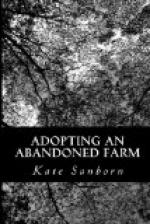And he was so gloriously handsome! Visitors from town would come expressly to see him. School children would troop into my yard on Saturday afternoons, “to see the peacock spread his tail,” which he often capriciously refused to do. As soon as they departed, somewhat disappointed in “my great moral show,” Beauty would go to a large window on the ground floor of the barn and parade up and down, displaying his beauties for his own gratification. At last he fancied he saw a rival in this brilliant, irridescent reflection and pecked fiercely at the glass, breaking several panes.
Utterly selfish, he would keep all dainty bits for himself, leaving the scraps for his devoted mate, who would wait meekly to eat what he chose to leave. She made up for this wifely self-abnegation by frequenting the hen houses. She would watch patiently by the side of a hen on her nest, and as soon as an egg was deposited, would remove it for her luncheon. She liked raw eggs, and six were her usual limit.
There is a deal of something closely akin to human nature in barn-yard fowls. It was irresistibly ludicrous to see the peacock strutting about in the sunshine, his tail expanded in fullest glory, making a curious rattle of triumph as he paraded, while my large white Holland turkey gobbler, who had been molting severely and was almost denuded as to tail feathers, would attempt to emulate his display, and would follow him closely, his wattles swelling and reddening with fancied success, making all this fuss about what had been a fine array, but now was reduced to five scrubby, ragged, very dirty remnants of feathers. He fancied himself equally fine, and was therefore equally happy.
Next came the molting period.
Pliny said long ago of the peacock: “When he hath lost his taile, he hath no delight to come abroad,” but I knew nothing of this peculiarity, supposing that a peacock’s tail, once grown, was a permanent ornament. On the contrary, if a peacock should live one hundred and twenty years (and his longevity is something phenomenal) he would have one hundred and seventeen new and interesting tails—enough to start a circulating library. Yes, Beauty’s pride and mine had a sad fall as one by one the long plumes were dropped in road and field and garden. He should have been caught and confined, and the feathers, all loose at once, should have been pulled out at one big pull and saved intact for fans and dust brushes, and adornment of mirrors and fire-places. Soon every one was gone, and the mortified creature now hid away in the corn, and behind shrubbery, disappearing entirely from view, save as hunger necessitated a brief emerging.
This tailless absentee was not what I had bought as the champion prize winner. And Belle, after laying four eggs, refused to set. But I put them under a turkey, and, to console myself and re-enforce my position as an owner of peacocks, I began to study peacock lore and literature. I read once more of the throne of the greatest of all the moguls at Delhi, India.




